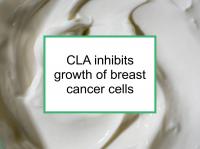A new study has helped explain the mechanisms by which conjugated linoleic acid (CLA) inhibits the growth of breast cancer cells in the laboratory. CLA is a fatty acid found primarily in dairy foods and meat which has been shown to inhibit the growth of both estrogen receptor positive (ER+) and estrogen receptor negative (ER-) breast cancer cells.
The authors show that CLA alters ER transcriptional activities and inhibits cancer cell adhesion and migration.
Previous studies concerning CLA benefits are contradictory
Previous laboratory studies have also found that CLA inhibits breast cancer cell growth and migration. CLA may also enhance the effectiveness of tamoxifen.
However, most studies that have investigated the association between CLA intake in the diet and risk of breast cancer in women have failed to find a protective effect for CLA. For example, a 2009 Swedish prospective study which included 61,433 women found no significant association between dietary CLA intake and risk of breast cancer, overall or by ER and PR status of the tumors.
A 2002 large prospective Netherlands population study found a weak positive association between CLA intake and the risk breast cancer (i.e., CLA intake was correlated with increased risk of breast cancer).
CLA supplements and breast cancer
Although we do not recommend supplementation with CLA, we want to advise those who do to avoid the t10,c12-CLA isomer (referred to on some supplement labels as Trans-10, Cis-12). The t10,c12 CLA isomer was found to enhance mammary tumor development two separate experiments using animal models of HER2+ breast cancer.
